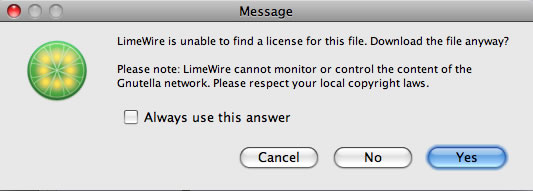The RIAA has succeeded in its four-year-long suit against LimeWire, with the latter found guilty of copyright infringement, induced copyright infringement, and unfair competition. Influenced by a previous Supreme Court case involving Grokster, an extinct P2P operation, US District Judge Kimba Wood determined that LimeWire optimized its features to ensure users could download illegal content.
It's said that the company purchased Google AdWords for queries such as "replacement napster," "napster mp3," "napster download," "kazaa morpheus," "mp3 free download," and dozens of other phrases containing the words "napster," "kazaa," and "morpheus." Furthermore, LimeWire's efforts to mitigate infringement were deemed insufficient.

As it stands, users have to agree not to use the software for copyrighted media and are alerted when doing so - and that message can be configured to never show again. Despite those measures, it's believed that 93% of the music available and 98.8% of content downloaded on LimeWire is protected by copyright. You can read Wood's 59-page ruling after the break.
What exactly this means for LimeWire's future isn't clear. If the service were to shut down, it would seriously dent the amount of P2P traffic - at least temporarily. NPD estimates that in 2009, LimeWire users accounted for 58% of folks who downloaded music via P2P software. In a statement, LimeWire said it opposed the verdict and it looks forward to its June 1 meeting with Judge Wood.